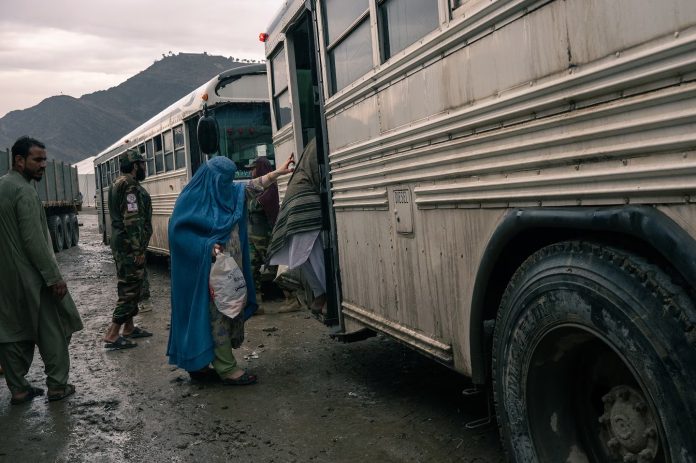At Pakistan’s main border crossing with northern Afghanistan, the narrow path into an uncertain future runs between two rusty iron fences and ends beneath a black-and-white flag of the Taliban-run government.
Many of the returning Afghan refugees who arrived here last week expected the worst as they stepped onto muddy Afghan soil amid torrential rain.
Caught up in a major deportation drive and forced to leave their homes in Pakistan, some had never been to the war-ravaged country their parents were born in. Others assumed they would barely recognize the cities they fled after the Taliban takeover in August 2021, where schools are now closed for many girls and music is prohibited.
But as they entered their transformed country, many refugees appeared puzzled. There was a poster wishing them a “good and comfortable life.” Rifle-wielding soldiers handed out food and wore bright garlands to celebrate the refugees’ return. Trucks stood ready to transport the returnees and their belongings to sprawling tent cities where 30,000 have found shelter and most families receive a $140 cash payment from the government.
“We wish we had returned sooner,” said Sardar Ali, 35, a laborer who was born in Pakistan to Afghan parents and who most recently worked in Rawalpindi.
Over 300,000 people have returned to Afghanistan in recent weeks, according to Afghan authorities. Pakistani officials say they want to make more than 1 million additional Afghans move back in the coming months.
Pakistan portrays the deportation drive as long overdue. For decades, the country has hosted millions of Afghans who arrived over several waves of migration beginning in the 1970s. Over 600,000 additional refugees fled to Pakistan in the wake of the Taliban takeover in 2021.
The deportations come amid mounting frustration in Islamabad with a surge in attacks in Pakistan that officials largely blame on religious militants suspected of hiding in Afghanistan’s rugged border mountains. By implicitly threatening to overwhelm Afghanistan with returnees, the Pakistani campaign appears designed to pressure the Afghan leadership to cracking down on the militants, analysts and humanitarian workers say. Afghan officials deny they are harboring the militants.
Pakistan’s deportation efforts may actually play into the hands of the Taliban-run government. It now has a rare opportunity to present itself as a government capable of managing a major humanitarian crisis and willing to welcome returnees, including those who fled the group’s 20-year armed campaign to seize control of Afghanistan.
While United Nations agencies, including the World Food Program and the International Organization for Migration (IOM), also provide assistance at the border, the Taliban is portraying itself as in control. The makeshift paths in the main refugee camp are lined with the Taliban’s Islamic Emirate flags. Soldiers on pickup trucks patrol the tent cities, where temporary mobile phone towers have been set up and Afghan carriers hand out free SIM cards.
“We pursued jihad so that we would one day be able to serve our people,” said Mohammad Adnan Junudi, 38, the military official in charge of reception operations on the Afghan side of Torkham, who joined the Taliban over a decade ago and says he was at one point jailed by U.S. forces. He called on all Afghans in Pakistan to return to their country. “The last few days have allowed us to prove who we really are.”
But the coming days could prove challenging. Forced to swap the tropical and subtropical climate of southern Pakistan for the frigid winters in the Hindu Kush, some of those who grew up in Pakistan are facing the first real winter in their lives. “We were born in Pakistan; we got married there,” said Mohammad Wali, 28, who used to live in Punjab province in Pakistan. “Why didn’t they at least let us stay until the end of the winter?”
Pakistan has in recent weeks responded to international criticism by making some concessions, saying that it will spare individuals who are waiting for resettlement in countries other than Afghanistan. But if Pakistan moves ahead with the deportation of most other undocumented Afghan refugees, it could still put an enormous strain on Afghanistan’s fragile economy and on a government that seeks to maintain tight control.
Many of the refugees who arrive in Torkham are laborers with few possessions. Some ran small food stalls or worked in brick factories. Some are women who were forced to leave Pakistan in a rush without their husbands.
Hadisa, clad in a blue burqa, said her husband was rounded up and arrested before they could leave for Afghanistan. The 35-year-old arrived in Torkham accompanied by a group of neighbors. But worried about traveling farther without a male relative, she has decided to wait for her husband near the Torkham crossing.









































